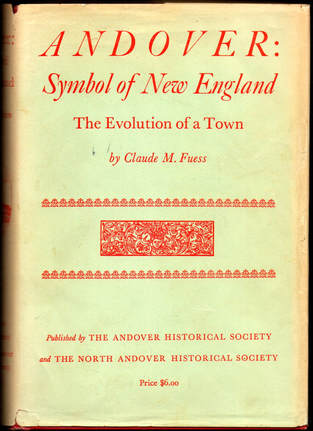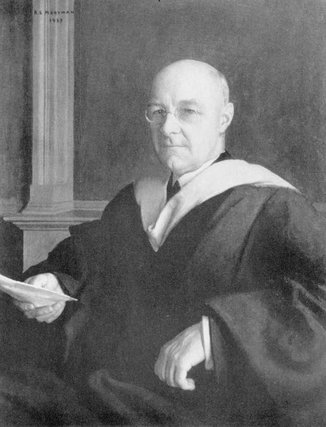Claude Moore Fuess (1885-1963) is an Andover character I'd like to learn more about. Headmaster of Phillips Academy from 1933 until his retirement in 1948, he wrote not only a history of the school but of the town, Andover: Symbol of New England, published jointly by the Andover Historical Society and the North Andover Historical Society in 1959. Born in Waterville, New York, Dr. Fuess had a long tenure here, arriving to teach at P.A. in 1908. What makes him interesting to me is how he embodies a time when the town and the gown were more closely associated. To cite just one bit of evidence: for many years he was a trustee of our public library, Memorial Hall. Today's P.A. headmaster, John Palfrey, is a trustee of a library to be sure, but it's the private Boston Athenaeum. What is even more interesting -- and surprising -- is that Dr. Fuess also trafficked with Lawrence, the mill town next door, addressing Lawrence High School students on graduation day for several years.
He acknowledged, however, a regional imbalance of power, one that began when the mills were built in Lawrence in the mid-nineteenth century. “The rapid rise of Lawrence and its subsequent expansion were naturally disturbing to Andover, which, although to some extent industrialized, still remained an orderly New England village," he wrote in his town history. "Lawrence, only three miles away, was a hurly-burly, a melting pot, a crowded and complex city with all the problems which a society without traditions or cultural background must meet. A large percentage of its alien population could not understand the principles upon which Andover had been established. … The pressure from those who favored a so-called ‘Greater Lawrence,’ with Andover as just another suburb, was to be aggressive, especially after Andover, for political reasons, was districted with some of the wards in Lawrence. This issue, always imminent, has not yet been settled.” (Fuess, Symbol, p. 267)
These are sentiments typical of men like Dr. Fuess, whose constricted vision of America and Americans in the mid-twentieth century carried forward the views of those who had earlier set a goal of "Americanization" for immigrants.
“Everywhere and always, first and last, she has been the manly, straight-forward, sober, patriotic New England town,” Phillips Brooks (1835-1893) once said of Andover. The occasion was the dedication of Andover's Memorial Hall on May 30, 1873. It's a debatable line to be sure, not to mention one whose syntax makes contradictory use of both "she" and "manly." Dr. Fuess, nonetheless, quoted it in his town history. Later in Reverend Brooks's dedication speech, however, he expressed something I think we all can embrace, and Dr. Fuess quoted that, too. “It is truth that we want in every department of our life," said the great grandson of P.A.'s founder, Episcopal rector of Boston’s Trinity Church, and composer of O Little Town of Bethlehem. "In State and Church we need it, at home and on the street; in the smallest fashions and in the most sacred mysteries... When we have that, we shall have at least a solid basis of reality on which to build all future programs.”
In subsequent posts I'll have more to say about Dr. Fuess's writings both about Andover the town and about P.A. i.e., An Old New England School*, published just a little over a century ago, in 1917.
To be continued.
*I borrowed the copy I'm reading from the Boston Athenaeum, where I am a member and a proprietor. It was signed and inscribed by Dr. Fuess to William Crowninshield Endicott Jr. in 1928. Mr. Endicott (1860-1936) is himself a character I would like to learn more about someday. According to the summary of his papers, which are at the Phillips Library at the Peabody Essex Museum in Salem, Massachusetts, he was a personal friend of Isabella Stewart Gardner, actively participated in the collecting and placing of art in what became her museum, was one of the museum's original seven trustees, and later served as its vice-president and president, respectively.
He acknowledged, however, a regional imbalance of power, one that began when the mills were built in Lawrence in the mid-nineteenth century. “The rapid rise of Lawrence and its subsequent expansion were naturally disturbing to Andover, which, although to some extent industrialized, still remained an orderly New England village," he wrote in his town history. "Lawrence, only three miles away, was a hurly-burly, a melting pot, a crowded and complex city with all the problems which a society without traditions or cultural background must meet. A large percentage of its alien population could not understand the principles upon which Andover had been established. … The pressure from those who favored a so-called ‘Greater Lawrence,’ with Andover as just another suburb, was to be aggressive, especially after Andover, for political reasons, was districted with some of the wards in Lawrence. This issue, always imminent, has not yet been settled.” (Fuess, Symbol, p. 267)
These are sentiments typical of men like Dr. Fuess, whose constricted vision of America and Americans in the mid-twentieth century carried forward the views of those who had earlier set a goal of "Americanization" for immigrants.
“Everywhere and always, first and last, she has been the manly, straight-forward, sober, patriotic New England town,” Phillips Brooks (1835-1893) once said of Andover. The occasion was the dedication of Andover's Memorial Hall on May 30, 1873. It's a debatable line to be sure, not to mention one whose syntax makes contradictory use of both "she" and "manly." Dr. Fuess, nonetheless, quoted it in his town history. Later in Reverend Brooks's dedication speech, however, he expressed something I think we all can embrace, and Dr. Fuess quoted that, too. “It is truth that we want in every department of our life," said the great grandson of P.A.'s founder, Episcopal rector of Boston’s Trinity Church, and composer of O Little Town of Bethlehem. "In State and Church we need it, at home and on the street; in the smallest fashions and in the most sacred mysteries... When we have that, we shall have at least a solid basis of reality on which to build all future programs.”
In subsequent posts I'll have more to say about Dr. Fuess's writings both about Andover the town and about P.A. i.e., An Old New England School*, published just a little over a century ago, in 1917.
To be continued.
*I borrowed the copy I'm reading from the Boston Athenaeum, where I am a member and a proprietor. It was signed and inscribed by Dr. Fuess to William Crowninshield Endicott Jr. in 1928. Mr. Endicott (1860-1936) is himself a character I would like to learn more about someday. According to the summary of his papers, which are at the Phillips Library at the Peabody Essex Museum in Salem, Massachusetts, he was a personal friend of Isabella Stewart Gardner, actively participated in the collecting and placing of art in what became her museum, was one of the museum's original seven trustees, and later served as its vice-president and president, respectively.


 RSS Feed
RSS Feed
